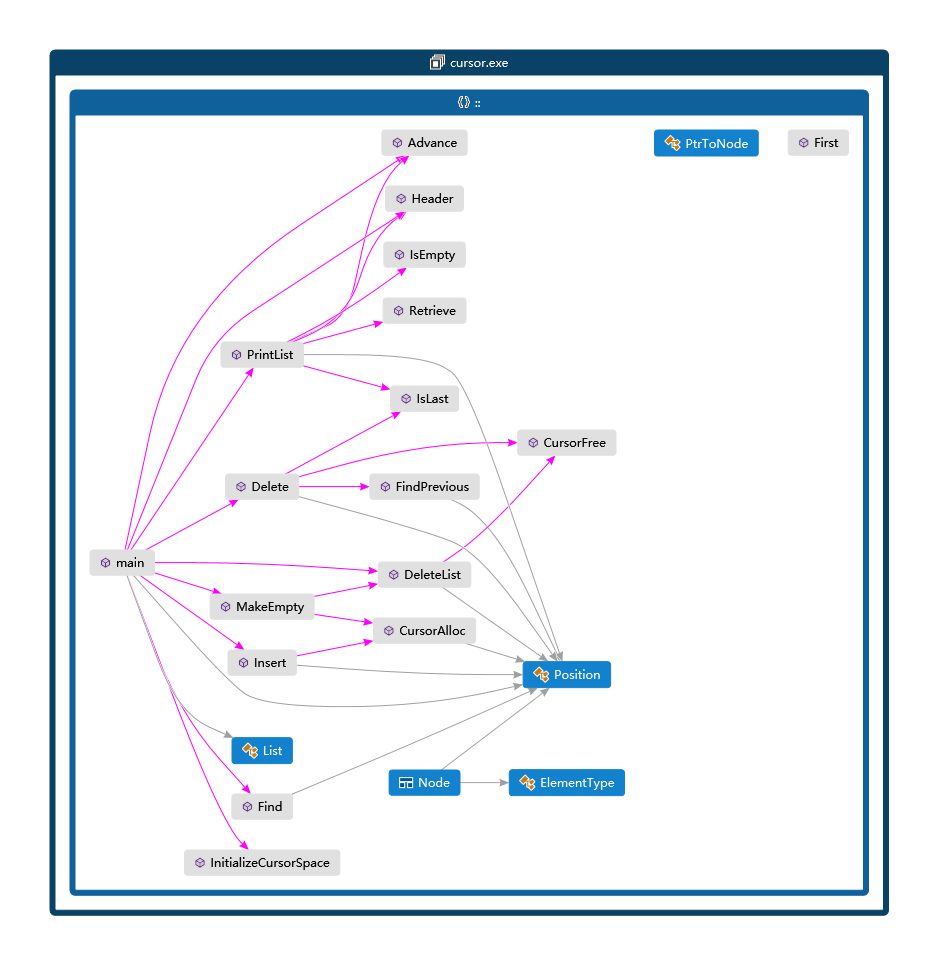3.线性表-cursor
fatal.h
#include <stdio.h>
#include <stdlib.h>
#define Error(Str) FatalError(Str)
#define FatalError(Str) fprintf(stderr, "%s\n", Str), exit(1)
cursor.h
typedef int ElementType;
#define SpaceSize 100
#ifndef _Cursor_H
#define _Cursor_H
typedef int PtrToNode;
typedef PtrToNode List;
typedef PtrToNode Position;
void InitializeCursorSpace(void);
List MakeEmpty(List L);
int IsEmpty(const List L);
int IsLast(const Position P, const List L);
Position Find(ElementType X, const List L);
void Delete(ElementType X, List L);
Position FindPrevious(ElementType X, const List L);
void Insert(ElementType X, List L, Position P);
void DeleteList(List L);
Position Header(const List L);
Position First(const List L);
Position Advance(const Position P);
ElementType Retrieve(const Position P);
#endif
cursor.c
#include "cursor.h"
#include <stdlib.h>
#include "fatal.h"
/* Place in the interface file */
struct Node
{
ElementType Element;
Position Next;
};
struct Node CursorSpace[SpaceSize];
static Position CursorAlloc(void)
{
Position P;
P = CursorSpace[0].Next;
CursorSpace[0].Next = CursorSpace[P].Next;
return P;
}
static void CursorFree(Position P)
{
CursorSpace[P].Next = CursorSpace[0].Next;
CursorSpace[0].Next = P;
}
void InitializeCursorSpace(void)
{
int i;
for (i = 0; i < SpaceSize; i++)
CursorSpace[i].Next = i + 1;
CursorSpace[SpaceSize - 1].Next = 0;
}
List MakeEmpty(List L)
{
if (L != 0)
DeleteList(L);
L = CursorAlloc();
if (L == 0)
FatalError("Out of memory!");
CursorSpace[L].Next = 0;
return L;
}
/* Return true if L is empty */
int IsEmpty(const List L)
{
return CursorSpace[L].Next == 0;
}
/* Return true if P is the last position in list L */
/* Parameter L is unused in this implementation */
int IsLast(const Position P, const List L)
{
return CursorSpace[P].Next == 0;
}
/* Return Position of X in L; 0 if not found */
/* Uses a header node */
Position Find(ElementType X, const List L)
{
Position P;
P = CursorSpace[L].Next;
while (P && CursorSpace[P].Element != X)
P = CursorSpace[P].Next;
return P;
}
/* Delete from a list */
/* Assume that the position is legal */
/* Assume use of a header node */
void Delete(ElementType X, List L)
{
Position P, TmpCell;
P = FindPrevious(X, L);
if (!IsLast(P, L)) /* Assumption of header use */
{ /* X is found; delete it */
TmpCell = CursorSpace[P].Next;
CursorSpace[P].Next = CursorSpace[TmpCell].Next;
CursorFree(TmpCell);
}
}
/* If X is not found, then Next field of returned value is 0 */
/* Assumes a header */
Position FindPrevious(ElementType X, const List L)
{
Position P;
P = L;
while (CursorSpace[P].Next &&
CursorSpace[CursorSpace[P].Next].Element != X)
P = CursorSpace[P].Next;
return P;
}
/* Insert (after legal position P) */
/* Header implementation assumed */
/* Parameter L is unused in this implementation */
void Insert(ElementType X, List L, Position P)
{
Position TmpCell;
TmpCell = CursorAlloc();
if (TmpCell == 0)
FatalError("Out of space!!!");
CursorSpace[TmpCell].Element = X;
CursorSpace[TmpCell].Next = CursorSpace[P].Next;
CursorSpace[P].Next = TmpCell;
}
/* Correct DeleteList algorithm */
void DeleteList(List L)
{
Position P, Tmp;
P = CursorSpace[L].Next; /* Header assumed */
CursorSpace[L].Next = 0;
while (P != 0)
{
Tmp = CursorSpace[P].Next;
CursorFree(P);
P = Tmp;
}
}
Position Header(const List L)
{
return L;
}
Position First(const List L)
{
return CursorSpace[L].Next;
}
Position Advance(const Position P)
{
return CursorSpace[P].Next;
}
ElementType Retrieve(const Position P)
{
return CursorSpace[P].Element;
}
testcurs.c
#include <stdio.h>
#include "cursor.h"
void PrintList(const List L)
{
Position P = Header(L);
if (IsEmpty(L))
printf("Empty list\n");
else
{
do
{
P = Advance(P);
printf("%d ", Retrieve(P));
} while (!IsLast(P, L));
printf("\n");
}
}
int main()
{
List L;
Position P;
int i;
InitializeCursorSpace();
L = MakeEmpty(0);
P = Header(L);
PrintList(L);
for (i = 0; i < 10; i++)
{
Insert(i, L, P);
PrintList(L);
P = Advance(P);
}
for (i = 0; i < 10; i += 2)
Delete(i, L);
for (i = 10; i < 15; i++)
{
Insert(i, L, P);
PrintList(L);
P = Advance(P);
}
for (i = 0; i < 10; i++)
if (Find(i, L) == 0)
printf("Element %d Find fails\n", i);
printf("Finished deletions\n");
PrintList(L);
DeleteList(L);
return 0;
}
函数调用关系图(Call graph)


 浙公网安备 33010602011771号
浙公网安备 33010602011771号